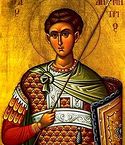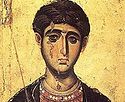

| Previous day | Next day |
| Old Style
October 26
|
Sunday |
New Style
November 8
|
| 22nd Sunday after Pentecost. Tone 5. | No fast.
|
![]() Holy and Glorious Great-martyr Demetrius the Myrrh-gusher, of Thessalonica (306). Commemoration of the Great Earthquake at Constantinople in 740 (740).
Holy and Glorious Great-martyr Demetrius the Myrrh-gusher, of Thessalonica (306). Commemoration of the Great Earthquake at Constantinople in 740 (740).
Martyr Lupus, slave of St. Demetrius of Thessalonica (306). St. Athanasius of Medikion Monastery (814). St. Theophilus of the Kiev Caves, archbishop of Novgorod (1482). St. Demetrius of Basarabov in Bulgaria (1685). St. Anthony, bishop of Vologda (1588). St. Alexander (Okropiridze), bishop of Guria and Mingrelia, Georgia (1907).
St. Cedd, bishop of Lastingham (664). St. Eata, bishop of Hexham and abbot of Lindisfarne (686). New Martyr Ioasaph, monk, of Mt. Athos, disciple of St. Niphon, patriarch of Constantinople (1536).
Repose of Hieroschemamonk Nilus of Kryuchi (1924), Elder Ignatius the Bulgarian, of Mt. Athos (1927), and Matushka Olga (A’rrsamquq) Michael of Kwethluk, Alaska (1979).
Thoughts for Each Day of the Year
According to the Daily Church Readings from the Word of God
By St. Theophan the Recluse

Twenty-Second Sunday After Pentecost. [Gal. 6:11-18; Luke 16:19-31]
The parable about the rich man and Lazarus shows that those who do not live as they should will suddenly wake up to reality, but they will no longer have the opportunity to correct their state. Their eyes will open and they will clearly see where the truth lies. Remembering that on the earth there are many who are blind as they were, they would like someone to be sent from the dead for the assurance that one must live and understand things only according to the indication of the Lord’s Revelation. But they will be denied even this, because for those who desire to know the truth, Revelation alone is a witness. But for those who do not desire it, and do not love the truth, even the resurrection of the dead will not be convincing. The feelings of the rich man in this parable are probably felt by everyone who departs this life. Consequently, according to the conviction of that world which will be the conviction of us all, the only guidance for us on the path of life is the Lord’s Revelation. But there, for many, this conviction will have come too late—it would have been more useful here, but not everyone had it. We will believe, at least, the testimony of those there, putting ourselves into their state. Those who are in torments do not lie; pitying us they want our eyes to be opened, that we not come to the place of their torment. We cannot say of this subject as we often do of current affairs, “Maybe somehow things will go all right.” No; it will not just go all right somehow. We must be fundamentally certain that we will not find ourselves in the place of the rich man.
Articles
 Commemoration of the Great Earthquake at ConstantinopleIn 740, at the time of the iconoclast emperor Leo the Isaurian, there was a terrible earthquake at Constantinople. |
 Martyr LupusThe Martyr Lupus lived at the end of the third century and beginning of the fourth century, and was a faithful servant of the holy Great Martyr Demetrius of Thessalonica (October 26). |
 Venerable Athanasius of Medikion MonasterySaint Athanasius of Medikion Monastery (+ ca. 814) loved the monastic life and secretly left his parental home, but was forcibly returned by his father. |
 St. Demetrius of BasarabovSaint Demetrius of Basarabov in Bulgaria lived in the wilderness as an ascetic near the city of Ruschuk, Bulgaria. |
 Monastic Martyr Joseph of Dionysiou, Mount AthosHe was an iconographer, and he painted the icon of the holy Archangels on the iconostasis of Dionysiou’s main church. |








